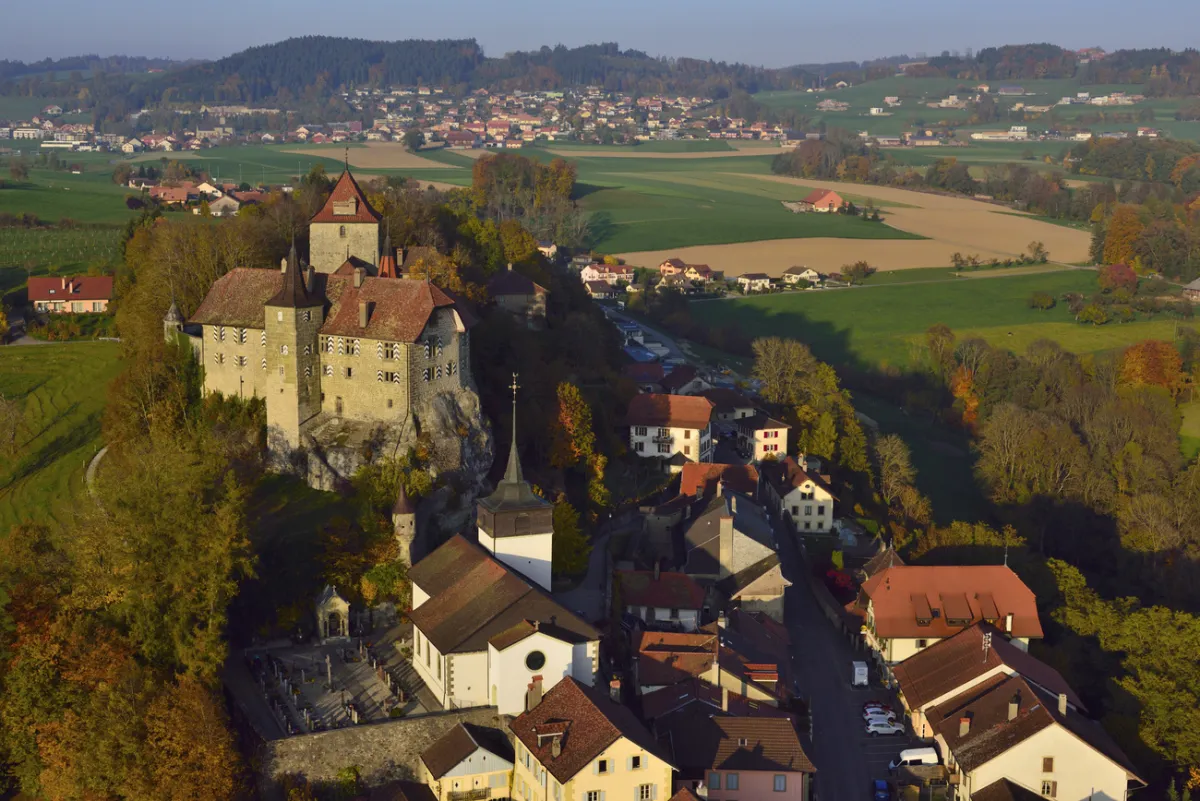
Is The Smallest Town In Europe Really In Switzerland?
I'm mainly in charge of translating, proofreading and publishing articles for SWI swissinfo. I also occasionally write press reviews and original articles on "Swiss oddities" - the things that make Switzerland unique. After studying history and religious studies, I began my journalistic career at Radio Fribourg. After a spell in the newsroom at the Swiss Telegraphic Agency, I joined SWI swissinfo in 2000, where I specialised in federal politics and history. I now translate, proofread and produce stories.
-
More from this aut
French Departm
-
Deutsch
de
Ist diese Freiburger Gemeinde wirklich die kleinste Stadt Europas?
Read more: Ist diese Freiburger Gemeinde wirklich die kleinste Stadt Eur
Français
fr
La plus petite ville d'Europe est-elle vraiment fribourgeoise?
Original
Read more: La plus petite ville d'Europe est-elle vraiment fribourge
Italiano
it
La più piccola città d'Europa è davvero friburghese?
Read more: La più piccola città d'Europa è davvero friburg
العربية
ar
هل توجد أصغر مدينة أوروبية في فريبورغ السويسرية حقًا؟
Read more: هل توجد أصغر مدينة أوروبية في فريبورغ السويسرية
Situated in the south of canton Fribourg, close to the border with canton Vaud, the medieval town of Rue is often referred to as“Europe's smallest town”. Rue proudly displays this title on its website.
This title is also widely used for tourism promotion. On its English page, Switzerland Tourism describes RueExternal link as the“smallest town in Europe” which“delights with its medieval streets, castle and nearby waterfalls, the Chutes des Chavanettes”. The Fribourg Tourism websiteExternal link states that“the town of Rue, the smallest town in Europe, invites you to explore its medieval streets”.
And indeed, a walk around the town confirms that the tourist offices are right. The place is medieval, charming and... small. The town was built around a rocky promontory at the top of which sits a castle. The winding streets are lined with traditional stone houses, a church, a few public buildings, ramparts and picturesque farmhouses.
Following a process of amalgamation with neighbouring municipalities, Rue now covers 23.2km2 and has a population of around 1,600. However, the historic medieval core covers only 0.2km2 and has an estimated population of just under 1,000 (there are no separate statistics for the market town alone).
External ContentThere are historical reasons for Rue's status as a town. Rue was one of the“new towns” built by the Counts of Savoy in the 13th century to consolidate their power in the region.
Several contendersAt first glance, the idea that Rue could be the smallest town in Europe doesn't seem impossible. Given its area and population, it may indeed appear tiny, especially when compared with Moscow, London or Berlin, or, more modestly, Geneva or Zurich.
But several other places can also lay claim to the title of“smallest town in Europe”. Among the names that come up most often are Durbuy (Belgium), Hum (Croatia) and the Vatican City. On tourism promotion sites, Durbuy External link and Hum External link are even described as the“smallest city in the world”.
But this is just marketing, as there are no official rankings. Even Guinness World Records doesn't list Hum as the world's smallest town. It lists the world's smallest stateExternal link and the world's smallest capital cityExternal link, but it doesn't have a specific category for“smallest city” or“smallest town”.
Tough to compareIf there is no official classification, it's probably because the relevant criteria fluctuate. When we talk about“smallest town” or“smallest city”, what do we base it on: surface area, number of inhabitants, a combination of the two?
A comparison between Rue and Durbuy clearly illustrates the difficulty of making such a classification. If we look at the historic centre alone, the Belgian town is indeed the smallest, with fewer than 400 inhabitants in an area of two hectares (0.02km2).
But if you change the scale and look at the municipality as a whole, the picture is quite different. Durbuy is made up of 41 villages and has more than 11,000 inhabitants over 157km2 – quite a lot for“the smallest town in the world”. Rue, on the other hand, comprises seven villages, with a total of 1,600 inhabitants over an area of 23.2km2.
Size isn't everythingThere's another factor that complicates the classification process. The very notion of a town or city fluctuates; criteria vary over time from country to country.
The situation is also complex in Switzerland. There is no federal law that provides a uniform definition of a town or city. And, as federalism dictates, the definition and criteria applied vary from canton to canton.
A place may be called a town or city because it was given that title in the distant past, or because it once acted as an urban centre, for example by hosting a regional market or an administration.
In addition to these historical considerations, there are more modern criteria based on statistics. In many cantons, there is a tendency to classify a municipality as a town as soon as the population hits 10,000.
More More Demographics Middle classes flock to Swiss 'boomburb'This content was published on Jul 27, 2012 As Switzerland's population hits eight million, swissinfo visits the town which has seen the greatest growth over the past decade.
Read more: Middle classes flock to Swiss 'boom
Legal Disclaimer:
MENAFN provides the
information “as is” without warranty of any kind. We do not accept
any responsibility or liability for the accuracy, content, images,
videos, licenses, completeness, legality, or reliability of the information
contained in this article. If you have any complaints or copyright
issues related to this article, kindly contact the provider above.


















Comments
No comment